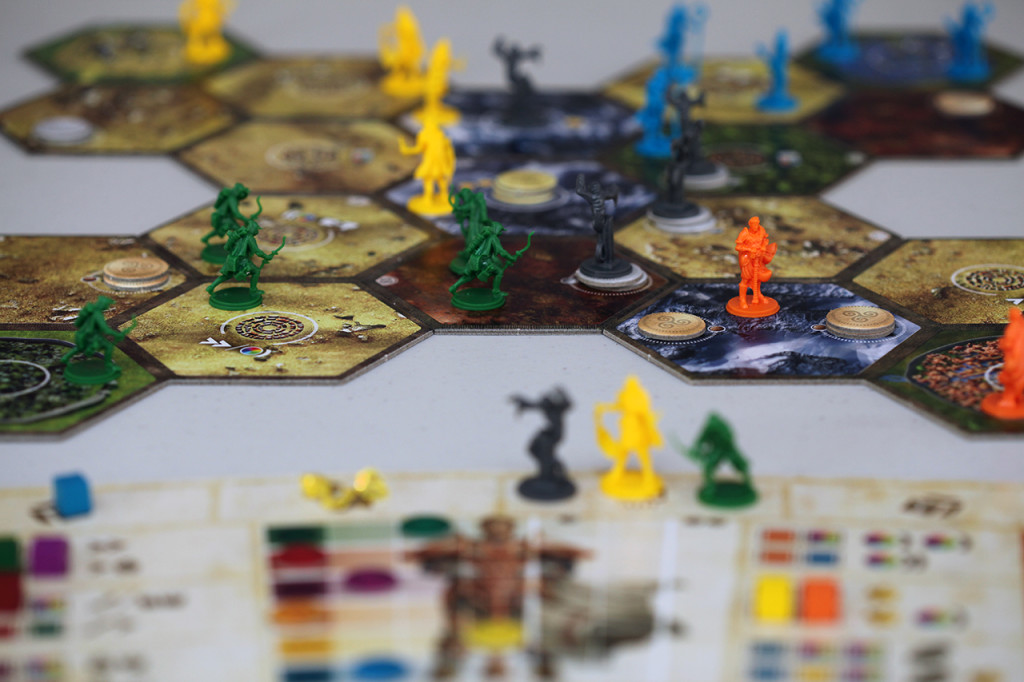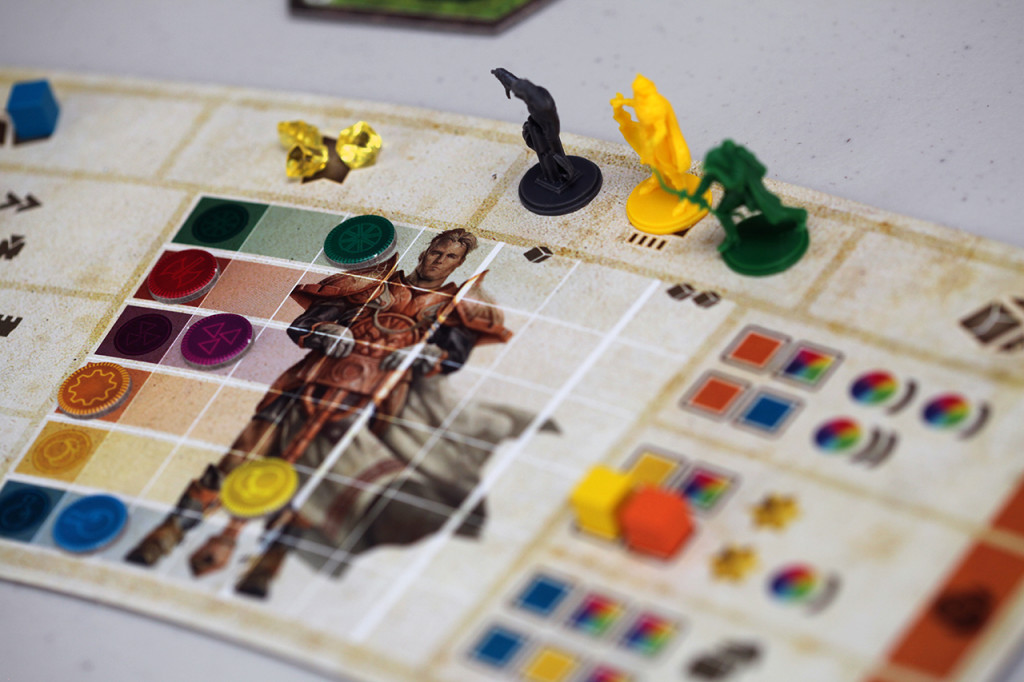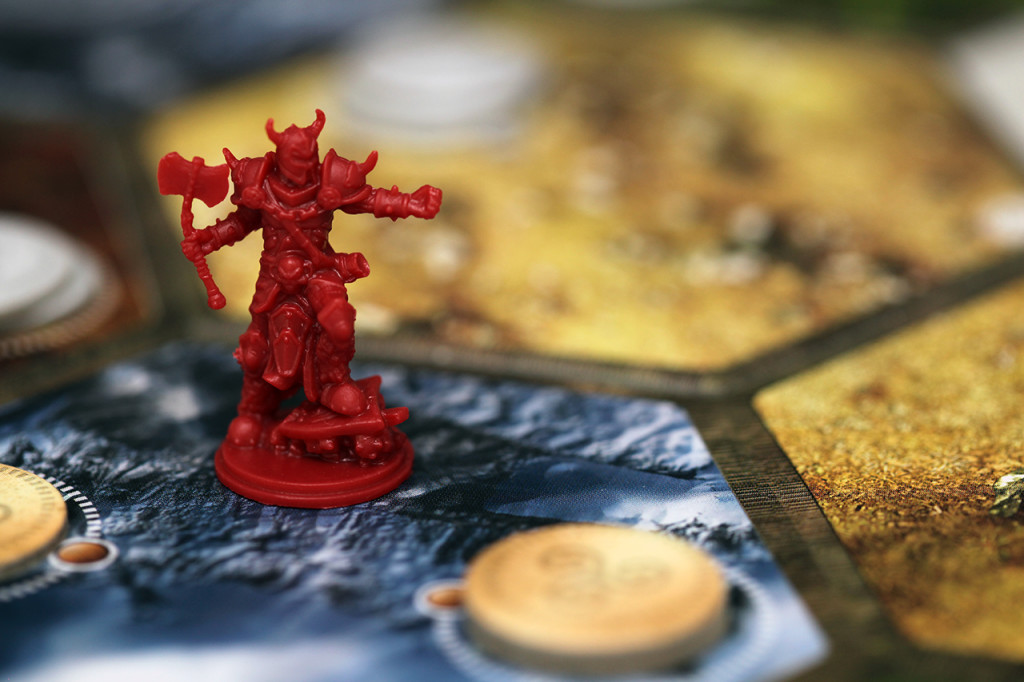Your kingdom has long wondered what would happen on this day – the day the barrier around the ruins of Hyperborea fell. Now it’s time to set forth and explore the land to claim its wealth for your own. Alas, no such task is ever unopposed, as the other nations of the surrounding regions seek the same; and the haunted remains of Hyperborea’s original inhabitants look to protect what was once their home. Explore, fight, and develop your kingdom towards greatness, or submit beneath the reign of your enemies.
Hyperborea is a “bag-building” civilization game from designers Andrea Chiarvesio and Pierluca Zizzi, published by Asmodee Edition. What is billed as a highly thematic civilization building game is actually, under the hood, much more of a streamlined abstract euro-game. Borrowing from the popular deck-building mechanics of Dominion and its ilk, Hyperborea reimagines the system with cubes in a bag, akin to Quarriors or Dice Masters. The bag building in Hyperborea is an avenue for guiding action selection—certain cubes provide access to certain actions during your turn. It will be your task throughout the game to efficiently manage your bag, purchase technologies that provide new action options, and slay your opponents in combat to maintain area control on a central map.
The Boiled Down Rules Explanation
Rather than go too far down the rabbit hole, it will be best to outline the basics of Hyperborea for context. Within the game, each player has a personalized board representing their own civilization, as well as a home section on a modular central board. You start the game with six cubes in your bag, each one representing a different part of your kingdom (war, trade, movement, building, knowledge and growth), plus one additional cube of your choice. On your turn, you have three cubes to work with (drawn at the end of your previous turn). These cubes can be assigned to the six action categories on your player board, which also correspond to the six different parts of your kingdom. Briefly, these categories allow you to:
- Exploration (Green): Move units around the center board
- Warfare (Red): Kill enemy units
- Growth (Purple): Create new units
- Progress (Orange): Advance your civilization to gain new cubes
- Trade (Yellow): Generate victory point crystals
- Science (Blue): Research new technologies
As the game progresses, researching technologies will allow you access to the additional action spaces on those cards. Most actions require two or more cubes to activate, but can be partially completed across multiple turns, allowing you to time when you want to activate a particular action without having to waste any cubes. Once the full requirement has been fulfilled, you gain the benefits of that action and can utilize them at any point during the current turn. Once an action is taken, however, it cannot be used again until a reset occurs. Keep in mind that the actions in each category on your player board are mutually exclusive, so you can’t perform both Exploration actions in a single reset, but if you really need an extra point of movement, you could think about taking the Warfare action that grants one, instead, for example.
Resetting your bag is one of the most important parts of Hyperborea; it adds a highly restrictive element to your bag management that makes efficiency paramount. At the end of your turn, you draw up to three cubes from your bag for use on your next turn. If you have less (one or two), you draw only those cubes. Only when your bag is completely empty at the end of your turn do you add ALL cubes back into it. This is a turn away from Hyperborea’s predecessors, which most commonly use a constant cycling of cards/dice.
Aside from the basic assignment of cubes, the center board offers a few action choices to work with. Each terrain tile has either a ruin or a city on it. As a free action (requiring no cubes), players can send one of their soldiers into the location to receive a one-time benefit. The closer to the center of the map you get, the more vulnerable you are to other players, but the more valuable the rewards in those cities and ruins. Piggybacking on the restrictive nature of the bag reset, units in cities or ruins are also locked in place until a reset occurs; meaning, like your cubes, you must efficiently manage where and when to send your troops, as you may find them stuck for a few too many turns in a less than ideal locale.
The game proceeds in this manner across a variable number of rounds, depending on the length of game chosen. There are three victory conditions: 1) Five technologies, 2) 12 Victory crystals, 3) 10 units. Players agree before starting on whether to play until one, two, or all three conditions are met. Individually, each condition is balanced in terms of time and difficulty to achieve, making all strategies viable across all game lengths chosen. We have found, though, that the short game (one victory condition) does not leave you with the same satisfying feeling of civilization development as the medium or long. We have also had the experience that once one win condition is met, a second one is also often met in close succession turn. Once triggered, the end game points will be tallied based on the number of cubes you’ve obtained, area control on the central board, total kills, technologies, and victory point crystals. The player with the most complex math equation as their score wins!
Thoughts
Simple in thought, but tough in execution, Hyperborea has a track record for not being at all what it seems. The oversized box boasts a strong artistic interpretation of the theme, making you feel like the inside is a host of flavor and personality. To be fair, it’s there, but you have to work hard to hold onto the backstory of your kingdom and remind yourself of the thematic exposition found in your actions. If you don’t have a complement of players ready to engage with the theme, “firing your ballistas” becomes “putting a red and green cube down to kill your dude.” Fortunately, even theme-first gamers in our group have found solace in the fact that it’s there, although maybe not at the forefront.
It seems to be that the reason this falls by the wayside is that Hyperborea is a wolf in sheep’s clothing. A few turns in and you realize that you’re pushing cubes — a lot of them, in fact — but that’s okay because it feels great. The game is interesting and engrossing, and it involves a level of thought that is complemented by the easy turn structure. “Sure, I can draw three cubes and put them somewhere! But where!?” That’s the question.
Optimization and efficiency are essential concepts, ones that don’t really ring true until the first time you draw but a single cube to use in your entire turn; then things click and you start to recognize some of the clever ways to engineer your bag in order to get your engine moving.
For a medium-weight game, Hyperborea also paces and scales very well. I’ve personally found enjoyment at all player counts from two to five, and see the game time really being determined more by your chosen length than the number of players. Analysis is a concern here, as with all games, but drawing your cubes at the end of your turn means planning can be done in between. There aren’t many drastic changes to the game state between turns — progress is steady and deliberate as opposed to swingy and random.
Randomness mitigation may be one of the strongest boons for Hyperborea because, much like Lords of Waterdeep, it lets you enjoy a fantasy aesthetic during a game that is largely deterministic. You’ll find no dice here, and see randomness only in the technology decks and the benefit counters found in ruins. These are mild sources that introduce a bit of reactive thinking as opposed to having perfect information. While you could argue that the cubes you draw are random (this is obviously true) I would contend that managing your bag by tracking and seeding it effectively is largely the whole game. Overcoming the bag draw by making sure everything you have in your bag is useful is one of the most interesting parts of Hyperborea.
Where my glowing recommendation as a reviewer hits a full stop is when considering the hefty $100 price tag that accompanies Hyperborea. Asmodee has done an excellent job packing the giant box to the brim with quality card stock, wood components, plastic minis, and shiny crystals. Still, few games are an easy sell at that price and this one is no different. At the $60 mark, Hyperborea is a no-brainer, which likely explains why this game has seen massive price drops since its release; however, trying to support your FLGS and purchasing Hyperborea does not seem to go hand-in-hand, unless you have access to a steep loyalty discount or similar program. Hyperborea is easily my Game of the Year from 2014, in terms of gameplay, yet I still can’t wholeheartedly recommend that you run out and pay full MSRP. Inside the box is a wealth of replay value and excellent gameplay, but I can’t see most gamers that I know getting their cost-per-play ratio down low enough to justify the purchase.
I think Hyperborea is the most successful and interesting “hybrid genre” game on the market, incorporating thematic integration with thinky, euro-style elements that make for a very rewarding and enjoyable experience. Sadly, my wallet might take some more convincing.
[su_custom_gallery source=”media: 10558,10555,10563″ limit=”3″ link=”lightbox” width=”230″ height=”230″ title=”never”]
League Ruling
Kelly B!
I will admit, when I was first convinced to play Hyperborea, it was just that: convincing. Buns had been working on reading through the rule book and he set up this game with what seemed liked a million components (cubes, minis, an ever-changing board, some cards, some different minis, a name for each color’s kingdom and so on and so forth) and I looked at it and felt my brain start to ache. I am a terrible learner of board games in that I care nothing for listening to rules explanations and, thus, often space out and end up being mad because I am kind of flying by the seat of my pants for much of my first several turns.
Despite the many components, Hyperborea is quite easy to learn and subsequently play. With that being said, it has continued value in that each kingdom lends itself to different strategies and each game will teach you the value of different actions, so you’re continually learning how you can play this game better. As mentioned above, you quickly learn how to efficiently utilize the cubes in your bag and the units you control so that you can make the most of your actions – that reset mechanic is killer. You also get more adept at figuring out your opponents end-game strategies (will they collect victory point gems, or maybe they’re going to overwhelm the board with units) and learning ways to combat their strategy while still furthering your own ends.
While this is not necessarily a game I’d like to play every day, it has quickly climbed my list of favorites and I would absolutely recommend it.
Smee’s Two Pence
For being so open with the choices available to you, Hyperborea is a very *tight* game, and learning to live within those restrictions is the first thing you’ll need to do in order to get the most out of it. On the map, you have to keep in mind the ‘lock-in’ requirements to activate a ruins or a city, and balance their powers against the number of units you have available. I’ve activated a city that grants movement points before, only to realize that I’d accidentally locked the unit I’d meant to use them with!
While the game rewards warfare, it encourages spreading the love around the table instead of preying on one weaker foe, and I like that, even if it might be frustrating trying to reach across the map to tally up the final kill that your set needs.
All in all, this is a game that I have enjoyed since I was first introduced into it, and while I’m no longer allowed to play the blue race (science rules!) while gaming with the League, I’d still give Hyperborea a good two thumbs up.
Dan
The first thing that I must caution you on is that looks can be deceiving with Hyperborea. While the box art conveys a highly thematic civilization building experience the game play however, does not reflect this at all. Hyperborea is an abstract eurogame at its core, with the only thematic element being the beautifully sculpted miniatures and artwork.
The driving mechanic, and my favorite aspect of the game, is the “bag-building.” I thoroughly enjoyed the puzzle that each draw from the bag presented. This really tickled my euro-gamer fancy. Yes, it’s somewhat random, but there are a number of ways to mitigate this and it’s up to you to optimize your resource management. In conjunction with the technology cards you acquire, there are also a number of satisfying combos that can be triggered each turn. The player boards, along with the color system utilized in the game, make for a very smooth and easy to understand experience.
Drawing your cubes in advance allows for some premeditated thought about your next turn to keep the pace moving. As the game wears on though moves become less predictable, more combos are manageable and turns start to drag as a tactical player may wish to hold off on making his or her decisions until their turn comes around so as to capitalize fully on the current board state. Also, lets not forget that, just because we are using cubes instead of cards, a bad draw in an already tight game, can still be frustrating and set your strategy back.
Furthermore, for a civilization building game there was a real lack of tension between players. Combat felt prescriptive and movement on the central board was too restrictive. This left little to no interactivity amongst the group, especially in lower player count games.
Hyperborea brings a number of innovative mechanics to the table alongside the amazing production quality we’ve grown accustomed to with Asmodee games. Those looking for a highly thematic saga will have to reach deep into their imaginations to overcome the abstract nature of Hyperborea. Those looking for an abstract euro puzzle will find more than enough in this box to entertain. I applaud the designers for attempting to cross the two but for me I would have preferred if they had picked one or the other and stayed the course. Hyperborea is definitely a game worth checking out but I would recommend you try before you buy to see if it’s the right fit for you.










